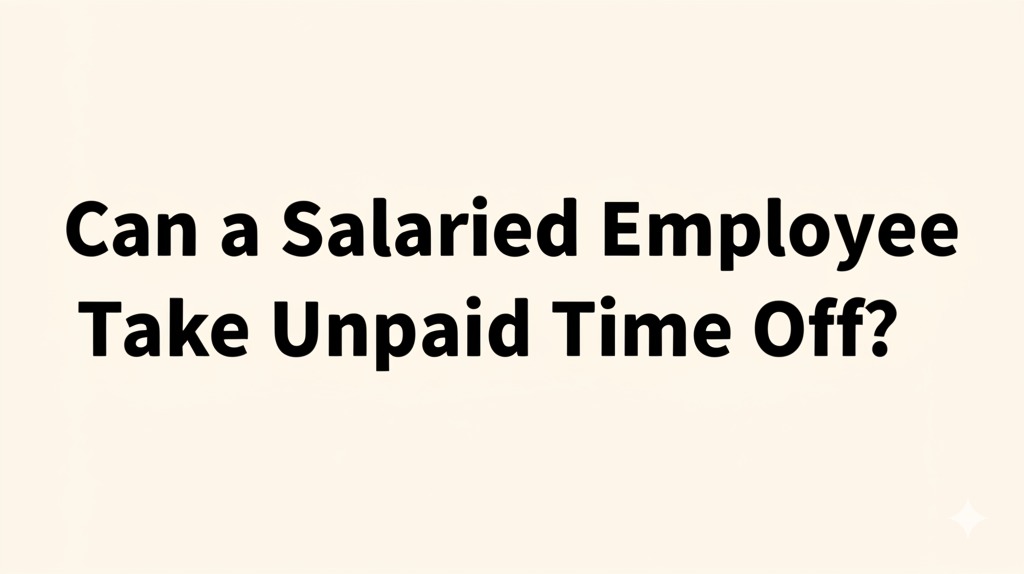
When you’re on a salary, it might seem like you’re locked into a fixed work routine. But what happens when life throws a curveball—like a family emergency, health issue, or the need for a mental break? Can salaried employees take unpaid time off without jeopardizing their job or paycheck?
This article dives into the legalities, employer policies, and practical considerations surrounding unpaid time off for salaried workers. Whether you’re an employee or employer, understanding the rules can help you navigate this tricky topic with confidence.
Understanding Salaried Employment
What Does It Mean to Be Salaried?
A salaried employee is typically paid a fixed annual amount, divided into regular pay periods—regardless of hours worked. This is different from hourly employees, who are compensated based on time worked.
Salaried roles often fall under the “exempt” category according to the Fair Labor Standards Act (FLSA), meaning:
- No entitlement to overtime pay
- Expectations of consistent workload
- Typically involves professional, executive, or administrative roles
Can Salaried Employees Legally Take Unpaid Time Off?
The short answer: yes—but with conditions.
Employer Policies Matter Most
While the FLSA allows for some flexibility, company policy often determines whether unpaid time off is permitted and under what circumstances.
Employers may allow unpaid time off for:
- Personal or family emergencies
- Extended vacations beyond paid time off (PTO) limits
- Medical or parental leave
- Educational or sabbatical leave
Before taking unpaid leave, always check your employee handbook or speak with your HR department to understand what’s permitted.
The Role of the Fair Labor Standards Act (FLSA)
The FLSA allows employers to dock pay for full-day absences for personal reasons, sickness, or disability if the employer offers unpaid leave and the absence isn’t covered by PTO.
However, deducting partial-day absences from a salaried employee’s pay is generally not allowed unless it’s under specific policies like the Family and Medical Leave Act (FMLA).
When Is It Appropriate to Take Unpaid Time Off?
Common Scenarios
Here are some situations where salaried employees may request unpaid time off:
- Out of PTO: You’ve used all your paid leave but need more time off.
- Long-Term Leave: You’re taking an extended absence (e.g., 3+ weeks).
- Life Events: Weddings, international travel, or family caregiving.
- Health-Related Needs: You don’t qualify for paid medical leave, but still need recovery time.
FMLA Protection
If you qualify, the Family and Medical Leave Act offers up to 12 weeks of job-protected unpaid leave for:
- Serious health conditions
- Birth or adoption of a child
- Caring for an immediate family member
FMLA only applies to companies with 50+ employees and workers who meet certain criteria (like having worked for 12 months).
How Does Unpaid Time Off Affect Your Salary?
Full-Day vs. Partial-Day Absences
- Full-Day Absences: Employers can deduct your pay legally.
- Partial-Day Absences: Generally cannot be docked unless under FMLA or similar policies.
Impact on Benefits
Taking unpaid leave may impact:
- Health insurance premiums (you may need to pay your portion manually)
- Vacation accruals
- Retirement contributions
Always ask HR how a leave might impact your benefits and paycheck deductions.
Best Practices for Requesting Unpaid Time Off
Taking unpaid time off doesn’t have to be stressful. Follow these tips to keep things smooth and professional:
1. Review Your Company Policy
- Know the rules around unpaid leave.
- Check for forms or documentation needed.
2. Communicate Early
- Give your manager or HR team plenty of notice.
- Explain the reason for your request (without oversharing).
3. Propose a Coverage Plan
- Outline how your duties will be handled in your absence.
- Offer to train a colleague or wrap up major projects beforehand.
4. Get It in Writing
- Request formal approval by email or a signed form.
- Keep a personal record for reference.
Pros and Cons of Taking Unpaid Time Off
Pros
- Flexible solution when PTO is exhausted
- Ideal for unexpected personal needs
- Can preserve job security (especially under FMLA)
Cons
- Loss of income for the missed days
- Possible disruption to benefits
- May affect perception at work if not managed well
Conclusion: Know Your Rights, Communicate Clearly
So, can a salaried employee take unpaid time off? Absolutely—but it depends on your employer’s policies, the nature of the absence, and relevant labor laws.
Whether it’s a well-deserved break or an unexpected emergency, understanding your options and responsibilities will make the process smoother. Always check with HR, plan ahead, and document everything for a stress-free experience.

Andre Cuevas provides career insights, job search strategies, and professional advice to help individuals navigate the job market and achieve their career goals.






